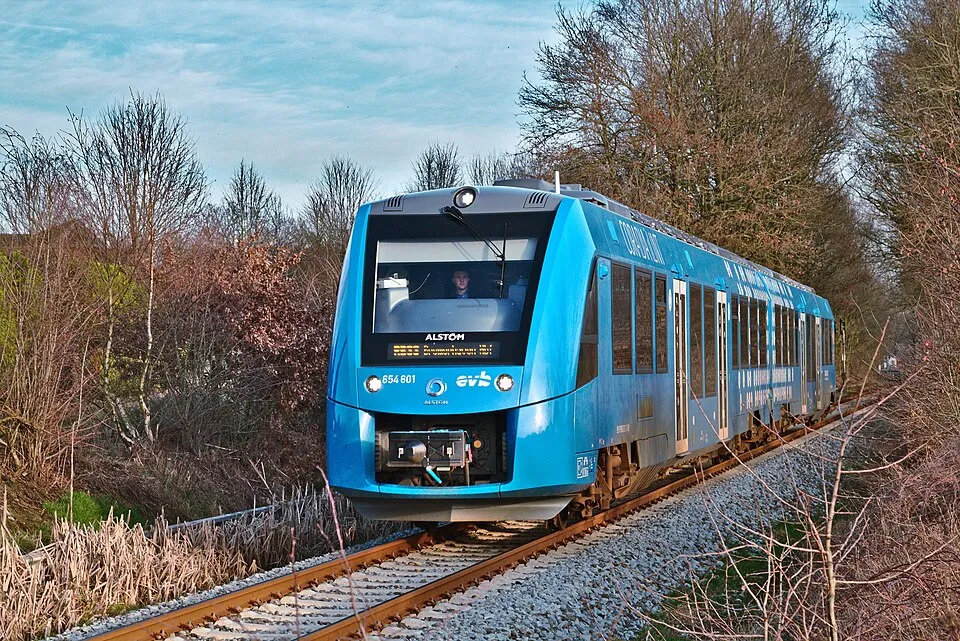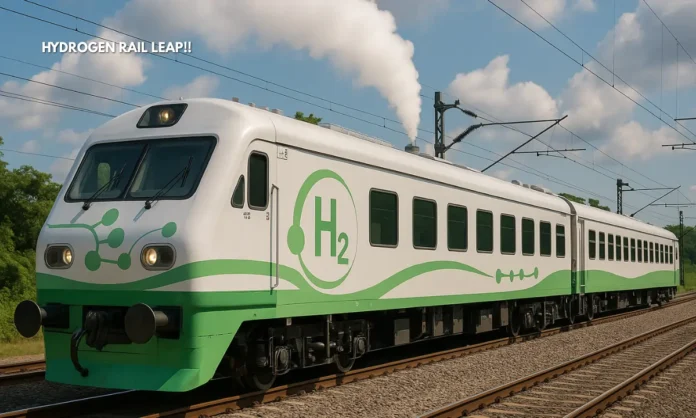Summary
- India successfully tests its first hydrogen-powered coach at Chennai’s Integral Coach Factory.
- A 1,200 HP hydrogen train is in development, with 35 hydrogen-powered trains planned under the “Hydrogen for Heritage” initiative.
- The move aligns with India’s zero carbon emission goals and positions it among global leaders in hydrogen rail technology.
India’s Leap into Hydrogen Rail Innovation
India has joined the ranks of nations pioneering hydrogen-powered rail systems with the successful trial of its first hydrogen coach, a landmark achievement for Indian Railways and the country’s green mobility agenda. Conducted at the Integral Coach Factory (ICF) in Chennai, the test underscores India’s resolve to embrace cutting-edge sustainable transport technologies. Railway Minister Ashwini Vaishnaw hailed the moment as transformative, sharing the video of the trial run and affirming India’s emergence as a leader in hydrogen rail technology.
Hydrogen-powered coach, with its zero-emission profile, have the potential to revolutionize railway systems by eliminating dependence on fossil fuels and significantly reducing carbon footprints. The tested Driving Power Car is a critical first step toward integrating hydrogen fuel cells into India’s railway network, marking the beginning of a greener and more self-reliant transport ecosystem.
India takes a giant leap in green rail tech! 🚆💨
— Indian_Growth_Story (@India_Grows) July 25, 2025
The first hydrogen-powered coach has been successfully tested at ICF, Chennai
With a 1,200 HP hydrogen train in development, India is set to join the global front-runners in sustainable rail innovation.#HydrogenTrain #GreenIndia pic.twitter.com/aJKq8wgtsi
The “Hydrogen for Heritage” Initiative
- Plans to roll out 35 hydrogen-powered trains, mainly on heritage and hill routes.
- ₹80 crore estimated cost per train; ₹70 crore per route for infrastructure.
- A pilot project worth ₹111.83 crore is underway on the Jind–Sonipat route.
The “Hydrogen for Heritage” initiative is central to Indian Railways’ sustainability roadmap. By retrofitting Diesel Electric Multiple Unit (DEMU) trains with hydrogen fuel cells, the railways aim to reduce greenhouse gas emissions and operational costs over the long term. This initiative is not only about technology but also about transforming India’s heritage routes into symbols of clean energy leadership. While initial costs are high, the long-term benefits, including lower maintenance and fuel costs, are expected to offset the investments.

Global Context and Strategic Significance
- India joins countries like Germany and Japan that have operational hydrogen trains.
- Hydrogen rail technology supports India’s 2070 net-zero targets.
- Potential to reduce dependence on imported fossil fuels while boosting domestic hydrogen production.
Globally, hydrogen-powered trains are seen as the next frontier in eco-friendly transport, with nations like Germany already running commercial services. For India, adopting this technology provides a dual advantage: positioning itself as a global player in green rail technology while advancing its national climate goals. The strategic use of hydrogen not only enhances energy security but also creates opportunities for new industries around hydrogen production and storage.
A Milestone for Future-Ready Railways
The successful hydrogen coach test is more than a technological triumph; it is a signal of India’s readiness to lead in sustainable mobility. With plans for mass rollouts, supportive policies, and domestic R&D, Indian Railways is set to redefine its operations in alignment with global sustainability benchmarks.
This milestone is a testament to India’s vision of integrating green energy with large-scale infrastructure, ensuring that future generations inherit a transport system that is cleaner, smarter, and more resilient.
Green Tracks Ahead: India’s Hydrogen Rail Push Signals a Sustainable Future
India’s successful test of its first hydrogen-powered coach marks a watershed moment for the country’s rail network and its broader green energy ambitions. This breakthrough not only places India among a select group of nations leading the hydrogen rail revolution but also demonstrates a serious commitment to achieving zero-carbon transport solutions. The “Hydrogen for Heritage” initiative, with its plan for 35 hydrogen trains, shows that the government is looking beyond pilot projects to large-scale deployment.
While the initial costs of hydrogen technology are high, the long-term benefits—reduced emissions, lower operational costs, and a cleaner energy footprint—are undeniable. The project also aligns seamlessly with India’s push for self-reliance in energy and transportation, potentially creating a new hydrogen economy.
This milestone is more than a technological advancement; it’s a strategic move that blends innovation with sustainability. If scaled effectively, hydrogen-powered trains could become a cornerstone of India’s transition to a green transportation ecosystem, setting the stage for a future where cutting-edge technology meets environmental responsibility.


